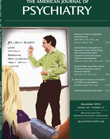Social Norm Processing in Adult Social Phobia: Atypically Increased Ventromedial Frontal Cortex Responsiveness to Unintentional (Embarrassing) Transgressions
Abstract
Objective:
Little is known about the neural underpinnings of generalized social phobia, which is defined by a persistent heightened fear of social disapproval. Using event-related functional MRI (fMRI), the authors examined whether the intent of an event, which mediates the neural response to social disapproval in healthy individuals, differentially affects response in generalized social phobia.
Method:
Sixteen patients with generalized social phobia and 16 healthy comparison subjects group-matched on age, gender, and IQ underwent fMRI scans while reading stories that involved neutral social events, unintentional social transgressions (e.g., choking on food at a party and coughing it up), or intentional social transgressions (e.g., disliking food at a party and spitting it out).
Results:
Significant group-by-transgression interactions were observed in ventral regions of the medial prefrontal cortex. Healthy individuals tended to show increased blood-oxygen-level-dependent responses to intentional relative to unintentional transgressions. Patients with generalized social phobia, however, showed significantly increased responses to the unintentional transgressions. They also rated the unintentional transgressions as significantly more embarrassing than did the comparison subjects. Results also revealed significant group main effects in the amygdala and insula bilaterally, reflecting elevated generalized social phobia responses in these regions to all event types.
Conclusions:
These results further implicate the medial prefrontal cortex in the pathophysiology of generalized social phobia, specifically through its involvement in distorted self-referential processing. These results also further underscore the extended role of the amygdala and insula in the processing of social stimuli more generally in generalized social phobia.



